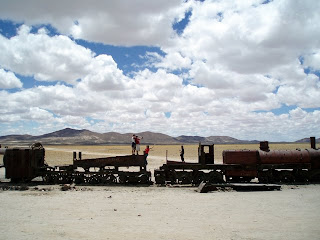
Well I'm back in Lima and it looks like I've left Tumbes for the last time. I think I can leave any place, no matter how mundane and boring it was or no matter how little time I spent there and still feel a little wistful, melancholic, sad that I won't ever see this place again. I think I am programmed for it.
My time in Tumbes was okay. The social and cultural part of Tumbes lacks stimulation. Regardless, it's easy to be happy. I ate what I wanted, slept just fine, worked a good job and spent mere pennies. My sentences in Spanish grew in length and depth. I got my camera charger fixed (for pennies), which wouldn't have happened in Canada (the technician hooked up a cell phone charger to the existing case, ingenious). I even had guitar lessons with a nimble fingered old carpenter where I learned boleros and other romantic Spanish styles that make the ladies swoon, I hear. Being happy is simple. But being optimistic is different and Tumbes didn't help.
The questions that have no answers keep piling on. And I'm losing the "everything is going to be fine" attitude that has kept me afloat in the past. Maybe it's being a tourist and a resident on this continent, and seeing the poverty contrast with the affluence in my pocket. Or maybe it's the beauty of these places that I'm seeing that shows me the full import of our problems. Maybe it's lack of someone argumentative in my life who would jump on the flaws in my arguments and dismantle them, and ridicule me mercilessly for thinking humankind and the planet earth is on the brink. But maybe it's just not true, maybe everything is not going to be fine.
They say it's about what you focus on. But at what point does focusing on the good stuff pretty much equal sticking your head in the sand, avoiding the reality of things? Enlighten me. Science, good science, is about not overstating your conclusions, not letting your data outstrip your conclusions. Not saying anything to a degree overboard. And science is telling us we're in trouble. And it is scary to hear, and hard to understand and so we find wool to pull over our eyes. I know I do. We focus on the things we can understand that aren't so scary, that aren't so hard to understand. Like big plans for the weekend. Like The Hills, NFL, NHL, Facebook, UEFA, Grey's Anatomy, Brad Pitt. And leave the change up to Obama.

This moment above, Pisani scoring the game winner in Game 5 of the Stanley Cup Finals meant the world to millions including me. Hearts exploded, the city went crazy. Front page news. But what does it really matter? I'm as guilty as anyone and that just makes me lose more optimism. If I can't even change, how can I expect anyone else to. The system makes it easy to lose yourself, to spend your time and money in a bubble that in the scheme of things, means nothing. Haha, the 'system.' I sound like a radical. Maybe someone needs to do something radical.

I look for optimistic things. The hole in the ozone is shrinking. We've made gains in education, women's rights, malnutrition, democracy. I hear education is the only way forward. But the root of the problem seems too fundamental to human nature to overcome. That we're all looking out for ourselves as people and this problem needs us to look out for ourselves as a species. I look for optimism and the only places that I find it - babies and Obama. Seriously.

Baby steps?








